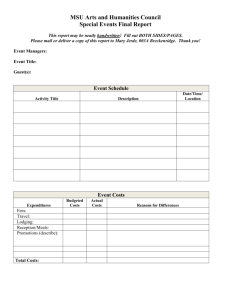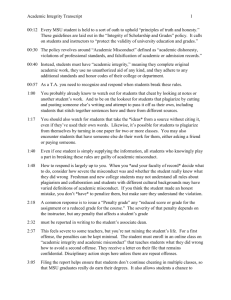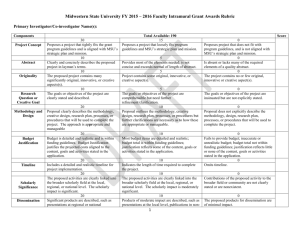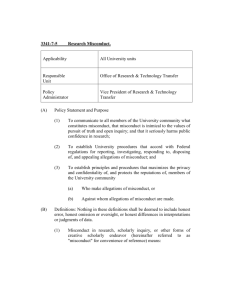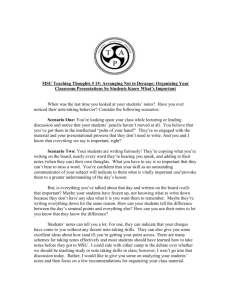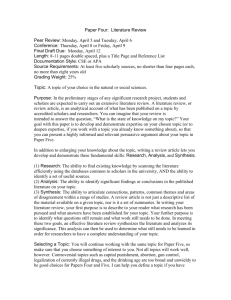Guidelines for Integrity in Research and Creative Activities
advertisement
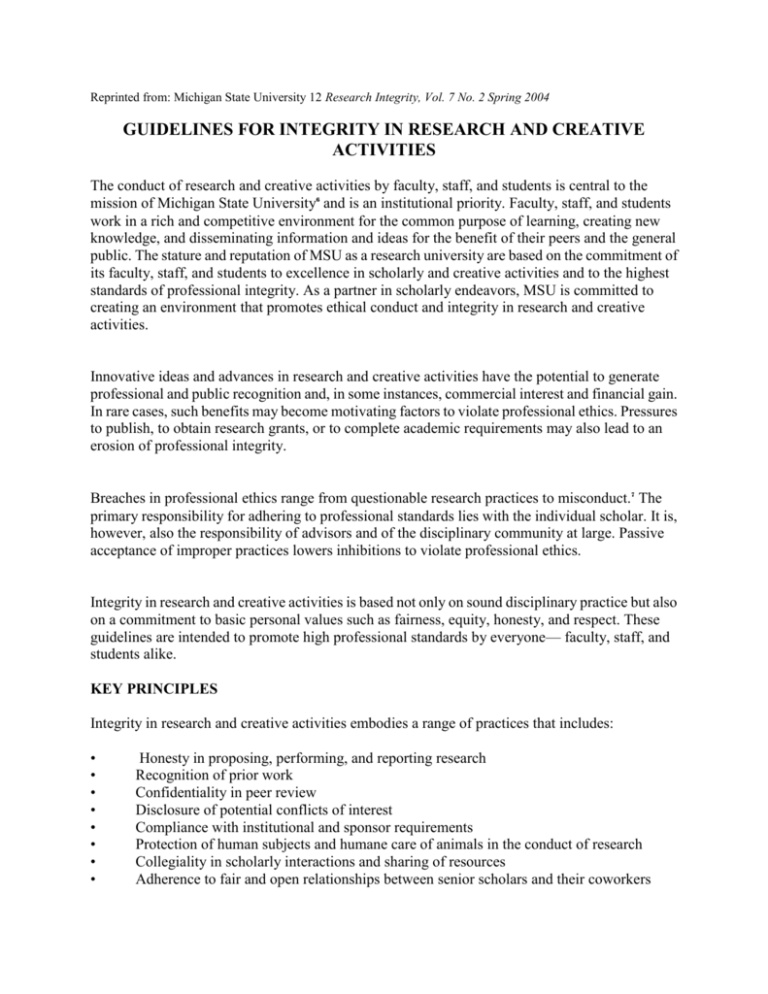
Reprinted from: Michigan State University 12 Research Integrity, Vol. 7 No. 2 Spring 2004 GUIDELINES FOR INTEGRITY IN RESEARCH AND CREATIVE ACTIVITIES The conduct of research and creative activities by faculty, staff, and students is central to the mission of Michigan State University6 and is an institutional priority. Faculty, staff, and students work in a rich and competitive environment for the common purpose of learning, creating new knowledge, and disseminating information and ideas for the benefit of their peers and the general public. The stature and reputation of MSU as a research university are based on the commitment of its faculty, staff, and students to excellence in scholarly and creative activities and to the highest standards of professional integrity. As a partner in scholarly endeavors, MSU is committed to creating an environment that promotes ethical conduct and integrity in research and creative activities. Innovative ideas and advances in research and creative activities have the potential to generate professional and public recognition and, in some instances, commercial interest and financial gain. In rare cases, such benefits may become motivating factors to violate professional ethics. Pressures to publish, to obtain research grants, or to complete academic requirements may also lead to an erosion of professional integrity. Breaches in professional ethics range from questionable research practices to misconduct.7 The primary responsibility for adhering to professional standards lies with the individual scholar. It is, however, also the responsibility of advisors and of the disciplinary community at large. Passive acceptance of improper practices lowers inhibitions to violate professional ethics. Integrity in research and creative activities is based not only on sound disciplinary practice but also on a commitment to basic personal values such as fairness, equity, honesty, and respect. These guidelines are intended to promote high professional standards by everyone— faculty, staff, and students alike. KEY PRINCIPLES Integrity in research and creative activities embodies a range of practices that includes: • • • • • • • • Honesty in proposing, performing, and reporting research Recognition of prior work Confidentiality in peer review Disclosure of potential conflicts of interest Compliance with institutional and sponsor requirements Protection of human subjects and humane care of animals in the conduct of research Collegiality in scholarly interactions and sharing of resources Adherence to fair and open relationships between senior scholars and their coworkers Honesty in proposing, performing, and reporting research. The foundation underlying all research is uncompromising honesty in presenting one’s own ideas in research proposals, in performing one’s research, and in reporting one’s data. Detailed and accurate records of primary data must be kept as unalterable documentation of one’s research and must be available for scrutiny and critique. It is expected that researchers will always be truthful and explicit in disclosing what was done, how it was done, and what results were obtained. To this end, research aims, methods, and outcomes must be described in sufficient detail such that others can judge the quality of what is reported and can reproduce the data. Results from valid observations and tests that run counter to expectations must be reported along with supportive data. Recognition of prior work. Research proposals, original research, and creative endeavors often build on one’s own work and also on the work of others. Both published and unpublished work must always be properly credited. Reporting the work of others as if it were one’s own is plagiarism. Graduate advisors and members of guidance committees have a unique role in guiding the independent research and creative activities of students. Information learned through private discussions or committee meetings should be respected as proprietary and accorded the same protection granted to information obtained in any peer-review process. Confidentiality in peer review. Critical and impartial review by respected disciplinary peers is the foundation for important decisions in the evaluation of internal and external funding requests, allocation of resources, publication of research results, granting of awards, and in other scholarly decisions. The peer-review process involves the sharing of information for scholarly assessment on behalf of the larger disciplinary community. The integrity of this process depends on confidentiality until the information is released to the public. Therefore, the contents of research proposals, of manuscripts submitted for publication, and of other scholarly documents under review should be considered privileged information not to be shared with others, including students and staff, without explicit permission by the authority requesting the review. Ideas and results learned through the peer-review process should not be made use of prior to their presentation in a public forum or their release through publication. Disclosure of potential conflicts of interest. There is real or perceived conflict of interest when a researcher has material or personal interest that could compromise the integrity of the scholarship. It is, therefore, imperative that potential conflicts of interest be considered and acted upon appropriately by the researcher. Some federal sponsors require the University to implement formal conflict of interest policies. It is the responsibility of all researchers to be aware of and comply with such requirements. Compliance with institutional and sponsor requirements. Investigators are granted broad freedoms in making decisions concerning their research. These decisions are, however, still guided, and in some cases limited, by the laws, regulations, and procedures that have been established by the University and sponsors of research to protect the integrity of the research process and the uses of the information developed for the common good. Although the legal agreement underlying the funding of a sponsored project is a matter between the sponsor and the University, the primary responsibility for management of a sponsored project rests with the principal investigator and his or her academic unit. Protection of human subjects and humane care of animals in the conduct of research. Research techniques should not violate established professional ethics or federal and state requirements pertaining to the health, safety, privacy, and protection of human beings, or to the welfare of animal subjects. Whereas it is the responsibility of faculty to assist students and staff in complying with such requirements, it is the responsibility of all researchers to be aware of and to comply with such requirements. Collegiality in scholarly interactions and sharing of resources. Collegiality in scholarly interactions, including open communications and sharing of resources, facilitates progress in research and creative activities for the good of the community. At the same time, it has to be understood that scholars who first report important findings are both recognized for their discovery and afforded intellectual property rights that permit discretion in the use and sharing of their discoveries and inventions. Balancing openness and protecting the intellectual property rights of individuals and the institution will always be a challenge for the community. Once the results of research or creative activities have been published or otherwise communicated to the public, scholars are expected to share materials and information on methodologies with their colleagues according to the tradition of their discipline. Faculty advisors have a particular responsibility to respect and protect the intellectual property rights of their advisees. A clear understanding must be reached during the course of the project on who will be entitled to continue what part of the overall research program after the advisee leaves for an independent position. Faculty advisors should also strive to protect junior scholars from abuses by others who have gained knowledge of the junior scholar’s results during the mentoring process, for example, as members of guidance committees. Adherence to fair and open relationships between senior scholars and their coworkers. The relationship between senior scholars and their coworkers should be based on mutual respect, trust, honesty, fairness in the assignment of effort and credit, open communications, and accountability. The principles that will be used to establish authorship and ordering of authors on presentations of results must be communicated early and clearly to all coworkers. These principles should be determined objectively according to the standards of the discipline, with the understanding that such standards may not be the same as those used to assign credit for contributions to intellectual property. It is the responsibility of the faculty to protect the freedom to publish results of research and creative activities. The University has affirmed the right of its scholars for first publication except for “exigencies of national defense”.8 It is also the responsibility of the faculty to recognize and balance their dual roles as investigators and advisors in interacting with graduate students of their group, especially when a student’s efforts do not contribute directly to the completion of his or her degree requirements. Misconduct in Research and Creative Activities Federal9 and University7 policies define misconduct to include fabrication (making up data and recording or reporting them), falsification (manipulating research materials, equipment or processes, or changing or omitting data such that the research is not accurately represented in the record), and plagiarism (appropriation of another person’s ideas, processes, results, or words without giving appropriate credit). Serious or continuing non-compliance with government regulations pertaining to research may constitute misconduct as well. University policy also defines retaliation against whistle blowers as misconduct. Misconduct does not include honest errors or honest differences of opinion in the interpretation or judgment of data. The University views misconduct to be the most egregious violation of standards of integrity and as grounds for disciplinary action, including the termination of employment of faculty and staff, dismissal of students, and revocation of degrees. It is the responsibility of faculty, staff, and students alike to understand the University’s policy on misconduct in research and creative activities7, to report perceived acts of misconduct of which they have direct knowledge to the University Intellectual Integrity Officer, and to protect the rights and privacy of individuals making such reports in good faith. RESOURCES “Guidelines on Authorship”, Endorsed by the University Research Council, January 15, 1998 (http://www.msu.edu/ unit/vprgs/authorshipguidelines.htm) “Integrity in Scientific Research: Creating an Environment that Promotes Responsible Conduct”, National Academies Press, Washington, D.C., 2002, 216 pp (http:// www.nap.edu/books/0309084792/html) “Research Data: Management, Control, and Access Guidelines”, Endorsed by the University Research Council, February 7, 2001 (http://www.msu.edu/unit/ vprgs/research_data.htm) Footnotes 6 Michigan State University “Mission Statement” approved by the Board of Trustees on June 24-25, 1982, (http://www.msu.edu/ unit/provost/resources/mission.html) 7 MSU Faculty Handbook, Chapter VI, “Research and Creative Endeavor-Procedures Concerning Allegations of Misconduct in Research and Creative Activities” (http://www.hr.msu.edu/HRsite/Documents/Faculty/Handbooks/Faculty/ResearchCreativeEndea vor/ vi-miscon-toc.htm) 8 MSU Faculty Handbook, Chapter VI, “Research and Creative Endeavor—Sponsored Research and Creative Endeavor” (http:// www.hr.msu.edu/HRsite/Documents/Faculty/Handbooks/Faculty/ ResearchCreativeEndeavor/vi-sponsoredresearch.htm) 9 Office of Science and Technology Policy, “Notice of Final Policy”, 65 CFR 76260.
